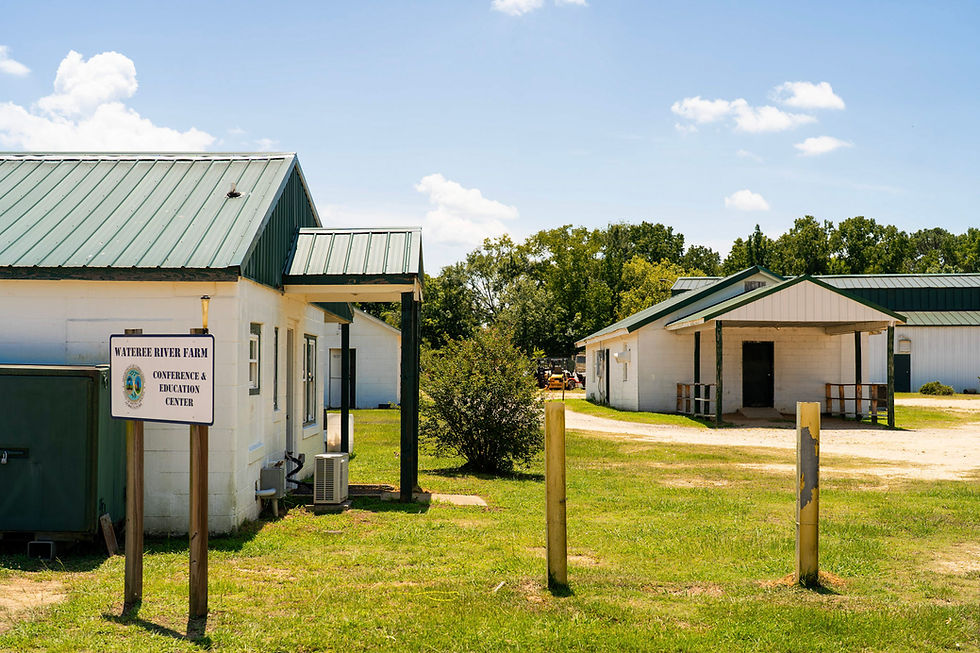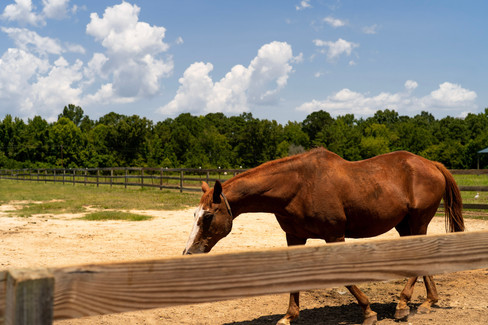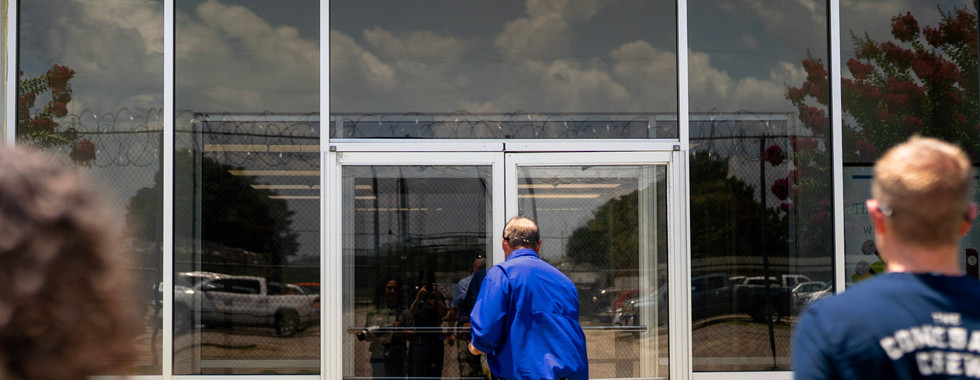Sowing Seeds of Change: Interview with Warden Donald Beckwith of Wateree Correctional
- Sydney Watts

- Aug 27, 2025
- 8 min read
How Wateree Correctional Facility Is Cultivating Hope and Hard Skills Through Brilliant Stewardship and Resourcefulness

Donald Beckwith serves as the warden of Wateree Correctional Institution, a medium, level 2 security facility for incarcerated men in South Carolina. Established in the 1890s, Wateree is the oldest prison in the state and carries a rich legacy of offering second chances through its distinctive agricultural and farming programs.
Now in his 17th year at Wateree, Warden Beckwith shares that he has no desire to serve anywhere else. His deep passion for reducing recidivism, crime, and addiction through agriculture and farming, while also equipping individuals with marketable job skills for future success, aligns seamlessly with the mission of the South Carolina Department of Corrections.
Warden Beckwith embodies what it means to lead with intention and by example. He lives on the farm as he teaches individuals to manage. His life reflects his belief in finding joy and purpose through cultivating God’s simple gifts. He embraces the toil required to sustain these blessings, modeling for the inmates a life of humility, stewardship, and dedication.

At the heart of his leadership is a belief that hands-on, hard work is the most effective way to teach his men. Through agricultural training, he aims not only to provide inmates with tools for future employment but also to help them encounter a path to success through the land and its resources. He hopes that each man is inspired by the fruits of his labor, realizing that with faith and hard work, a future full of promise is possible.
During our visit, Warden Beckwith led members of the JUMPSTART SC team through a comprehensive tour of the facility. He showcased the various programs, services, and expansive farmland, illustrating how each component works together to fulfill the prison’s mission: preparing men to reenter society equipped for success, rather than return to a cycle of incarceration.
Overview of the Wateree Prison Farm
The South Carolina Department of Corrections (SCDC) owns 10,000 acres of farmland, with 7,000 of those located on the grounds of Wateree Correctional Institution. This land plays a vital role in SCDC’s Agriculture and Food Services Division, as the crops and dairy products produced here help meet the nutritional needs of all 21 state prisons. Operated by Wateree inmates under the guidance of trained staff, the land primarily functions as a row crop and dairy farm. Any surplus is sold to surrounding communities, with the revenue reinvested into the agricultural program to fund operations and work toward the goal of complete self-sustainability.
The overarching goal of this initiative is to maximize harvests and minimize food costs for the agency. By producing food internally, the program significantly reduces expenses for the department and state taxpayers.
Let’s take a closer look at the programs run by Wateree Correctional and how each inmate plays a key role in its sustainability, while gaining essential life and job skills to support a successful, fulfilling life beyond incarceration. Click each program title below to learn more:
Thoroughbred Retirement Foundation
The Thoroughbred Retirement Foundation (TRF) stands out as one of Wateree Correctional Institution’s most impactful programs. Wateree is one of only eight facilities nationwide to offer this unique initiative, which pairs inmate rehabilitation with horse rescue. The program began in 2004 after former Warden John Carmichael read a New York Times article about a similar initiative at an institution in New York. Inspired by the dual benefits for both inmates and retired racehorses, he set out to bring the program to South Carolina.
Knowing the state would likely not fund the effort, former Warden Carmichael raised private donations to cover startup costs. With enough funding secured, TRF signed a lease for the stables, and Wateree welcomed its first herd of retired racehorses in 2004. Since then, the program has been fully sustained through donations.
For over 20 years, the TRF has sent retired racehorses in desperate need of rehabilitation down to the Seabiscuit Stables at Wateree Correctional. Inmates, selected for their interest and clean disciplinary record, care for and train the horses until they are adopted. Currently, 33 retired racehorses live at the facility under the attentive care of these inmate handlers.
The heart of this program lies in the power of its purpose. Former Warden Carmichael recognized the potential for mutual gain between the inmates and the horses. Today, Warden Beckwith attests to the deep impact this partnership has had on the collective morale of Wateree.
On the surface, the program gives retired racehorses a second chance at life. However, Warden Beckwith shares that the deeper value lies in the emotional connection forged between horse and handler. The racehorses and the inmates often share a very similar story. They both often come from backgrounds marked by pain, rejection, or trauma. This shared sense of brokenness creates a space for healing. It’s a great way to teach inmates with a tattered past to understand the reciprocity of love and emotions. As horses respond to human emotions and behavior, inmates learn emotional regulation, patience, empathy, and problem solving, which are essential skills for healthy relationships and personal growth.

These lessons extend beyond the prison walls. Through hands-on labor and professional guidance from TRF staff and local trainers, inmates learn how to properly care for horses. Many go on to earn Groom Elite Certifications, preparing them for high-paying jobs in the equine industry after release.
Ultimately, this program offers more than rehabilitation for retired racehorses, it offers incarcerated men a second chance to experience responsibility, connection, and compassion. By teaching emotional intelligence and practical skills, it equips them for success both in prison and beyond.
Dairy Farm / Wateree Dairy Training School
Wateree Correctional also operates an extensive dairy farm, complete with a state-of-the-art training program. The farm is home to hundreds of cows in its various pastures that are cared for by approved inmates who are eager to spend their time working outside the dorms. The dairy farm produces a large volume of milk, which is processed, packaged, and distributed by inmates to all of the prison facilities in South Carolina in order to meet their nutritional needs. This in-house operation eliminates the need for external milk suppliers, resulting in significant cost savings for SCDC and South Carolina taxpayers.
What makes the program even more impactful is that Director of Agriculture, Rick Doran, and PUSD Lead Teacher, A. Desai, expanded it into a vocational training opportunity. Inmates with an interest in agriculture can enroll in the Wateree Dairy Training School, where they train under the dairy manager and learn skills such as milking, processing, animal health, and cattle breeding. The goal is to equip inmates with marketable skills they can use after release in a high-demand job market.
Warden Beckwith and Rick Doran are committed to creating meaningful work opportunities for incarcerated individuals, work that not only supports institutional needs but also prepares inmates for a successful reentry. Today, the dairy program stands as an official vocational education initiative that offers both rehabilitation and hands-on workforce training.
Row Cropping
In addition to its dairy operations, Wateree uses its remaining agricultural land for row crops such as corn, wheat, soybeans, and various vegetables. Similar to the dairy farm, these row crops are cultivated by inmates, producing substantial yields that are processed into grits, cornmeal, and other food products. These items are either distributed to the institutions throughout the state for inmate consumption or used to feed the livestock on the farm. Inmates play a key role in this process, including operating the on-site gristmill where corn is ground into grits and cornmeal. The finished products are then packaged and distributed to all South Carolina correctional facilities, helping meet the dietary needs of the state’s incarcerated population.
The Wateree Farm staff takes pride in providing healthy, sustainably grown food to every institution in the state. In the same model as the dairy farm, any surplus is sold to nearby communities, with proceeds being reinvested into Wateree’s agricultural programs to support long-term sustainability.
Beyond its practical benefits, the row cropping initiative also serves a rehabilitative purpose. Warden Beckwith emphasizes the value of giving inmates the chance to leave their dorms and spend time outdoors, engaging in communion with nature and fellow inmates. The program also offers hands-on training in farming and heavy equipment operation and maintenance, skills that are lucrative and highly transferable to careers in horticulture, agriculture, and machinery. Under the guidance of experienced supervisors, inmates learn the discipline and reward of hard work.
For Warden Beckwith, this initiative fulfills a larger mission: to ensure that when inmates are released, they’re not starting from scratch. Instead, they leave with real-world experience, practical skills, and a foundation on which to build a better future.
Wastewater Treatment Plant & Vocational Training Programs
Like all correctional facilities in South Carolina, Wateree Correctional is required to treat its wastewater to meet environmental standards. However, Wastewater Management Supervisor Kevin Kirkpatrick has turned this requirement into an opportunity to train inmates in a high-demand, high-paying field. By gaining hands-on experience in wastewater treatment, inmates significantly improve their job prospects upon release.

Specifically, an inmate at Wateree Correctional recently became the first in SCDC to earn a Class B wastewater treatment certification, which exemplifies the mastery of skills that can be acquired through the program. This achievement reflects SCDC’s commitment to creating dual-impact initiatives that not only serve the facility’s operational needs but also equip inmates with meaningful vocational training for life after incarceration.

Beyond wastewater treatment, Wateree offers additional trade programs in welding, carpentry, and mechanics. Inmates interested in carpentry are trained to operate the on-site sawmill, processing timber from prison land into usable lumber for construction and repairs. The facility also includes a welding shop, mechanic shop, farm maintenance shop, and hammer mill, with each providing hands-on training under the supervision of skilled staff that can be translated into a desirable trade.
Community Outreach Initiatives
Warden Beckwith has thoughtfully utilized parts of the land owned by SCDC to create outreach opportunities that connect the surrounding community to the work being done at Wateree Correctional. His goal is to teach children the same values and skills he instills in his inmates, specifically how to live off the land and care for the simple gifts that God has provided through nature.
Wateree Farm Supervisor, Thomas Lindler, plants and maintains a large sunflower field that is leveraged as a dove field during the fall. This provides a space for children and their parents to visit Wateree, engage with staff, and participate in meaningful outdoor activities. It also serves as a hands-on learning experience, teaching youth about stewardship, agriculture, marksmanship, safety, and patience.
Another outreach effort close to Warden Beckwith’s heart is the development of on-site fishing ponds. Through a partnership with the Department of Natural Resources, the ponds are stocked free of charge and used for annual visits from children living in orphanages across the state. For many of these children, it’s a rare opportunity to enjoy the outdoors, and the Warden uses this time to share love, encouragement, and the Gospel with them.
As a final personal touch, Warden Beckwith planted a fruit orchard on the grounds as a tribute to his dedicated staff, those who work tirelessly each day to ensure Wateree’s land and operations run smoothly and effectively.
Providing Acres of Opportunity for Change
These initiatives not only provide enriching experiences for the community but also allow local stakeholders to personally witness how SCDC land is being used to care for both inmates and the broader community.
“We take a holistic approach. None of what we produce has any harsh pesticides. We don’t try to manipulate nature; we are just utilizing all that God gives us."
This captivating statement from Warden Beckwith captures the heart of his mission.
SCDC and Wateree Correctional Institution were entrusted with thousands of acres of land and could have taken any route they desired to use it. Instead of exploiting it for their own benefit, Warden Beckwith took it as an opportunity to develop various, expansive agricultural initiatives that would serve the needs of SCDC and provide inmates with multiple skillsets required for high-demand, high-paying jobs. Warden Beckwith is committed to using his time, energy, and resources to provide inmates with opportunity, because he knows that CHANGE is possible for these inmates!
At JUMPSTART SC, our mission aligns closely with Warden Beckwith’s to help inmates believe that their future can be brighter than their past when they walk in the light of the Lord. It’s encouraging to see this shared vision reflected in the leadership at Wateree. While our approaches may differ, we are united in our goal: to equip incarcerated men with the faith, hope, and skills they need to break the cycle of incarceration and reenter society with purpose.
Thank you to all those who made this trip possible, including Warden Beckwith, Chrysti Shain, and Joseph Cashion. Thank you for partnering with us to offer second-chance opportunities to those incarcerated in South Carolina. You are transforming lives!
💸 Every dollar you give fuels our 360-degree program… serving not only Wateree, BUT 19 out of 22 prisons across South Carolina! Would you consider sponsoring someone on their journey to make their future greater than their past in Christ? Click the link below!















































Comments